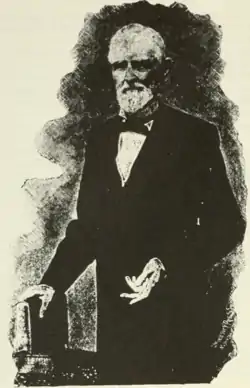4
CONFEDERATE VETERAN.

JEFFERSON DAVIS AT EIGHTY.
Jefferson Davis was born in 1808, and lived 81 years. His birth place was in a broad, low house at Fairview, a small village in Christian — now Todd — County, Kentucky. He visited the place in 1886 and participated in the dedication of a pretty brick Baptist church, that had been erected on the site of the old house. There was a large gathering of people from the neighborhood, while others had gone many miles through excessive rain. It was a most disagreeable day. As the venerable gentleman stood in the midst of the congregation, whose happy faces are indelibly impressed upon the mind of the writer, he used this language: "Many of you may think strangely of my participation in this service, not being a Baptist. My father was a Baptist, and a better man."
In her Memoirs of Jefferson Davis his wife copied just as he furnished them to a stenographer, facts about his family and his own career, points of which are embodied in this little sketch.
Three brothers came from Wales in the early part of the Eighteenth Century and settled in Philadelphia. The youngest, Evan Davis, subsequently removed to Georgia, then a colony of Great Britain. He was the grandfather of Jefferson Davis. The father, Samuel Davis, had moved from Augusta, Ga., to Southwestern Kentucky, and resided at Fairview when Jefferson, the tenth and last child, was born.
Samuel Davis had entered the army of the Revolution at the age of sixteen, with two half brothers named Williams, and while a boy soldier, met the beautiful Jane Cook in South Carolina, who became his wife and the mother of Jefferson Davis. In his infancy the family moved to Louisiana, but ill health induced their return to Wilkinson County, Miss. Three of his brothers were in the War of 1812, and the fourth volunteered, but "was drafted to stay at home." The Mississippi home of Samuel Davis was rather on a divide, whereby to the west on rich land were Virginians, Kentuckians and Tennesseans, and to the east on inferior soil were South Carolinians and Georgians. The settlements were sparse, however, for Mississippi was then of the territory ceded by Georgia to the United States, and there were but few schools. At the age of seven Jefferson Davis was sent on horseback through the "wilderness" to a Catholic school in Washington County, Kentucky. He journeyed with Maj. Hinds, who commanded the Mississippi Dragoons in the battle of New Orleans, and his family. On reaching Nashville they went to the Hermitage for a visit to Gen. Jackson. In the reminiscences Mr. Davis dwells upon that prolonged visit of several weeks and upon his "opportunity to observe a great man," and he had always remembered "with warm affection the kind and tender wife who presided over his house." Gen. Jackson then lived in "a roomy log house, with a grove of fine forest trees in its front."
In that Catholic school for a time young Davis was the only Protestant boy and he was the smallest. He was very much favored and roomed with the priest. One night he was persuaded by some associates to blow out the light in the reverend father's room that they might do some mischief, which they did in a hurry. He was interrogated severely, but said he "didn't know much, and wouldn't tell that." Finally he agreed to tell a little about it on condition that he be given his liberty. That little was that he blew out the candle. After two years steamboats had been put on the river, and by a steamer the lad returned home from Louisville.
Conforming to a plan proposed by his brother, who went after him, the happy lad, with throbbing heart, approached his dear old mother and asked if she had seen any stray horses round there. She had seen a "stray boy," and clasped him to her arms. He ran to the field where he found his father, who took him in his arms with much emotion and kissed him.
Young Davis went afterward to neighborhood schools, which were very poor, but one Mr. Shaw, from Boston, advanced him more than any other teacher he ever